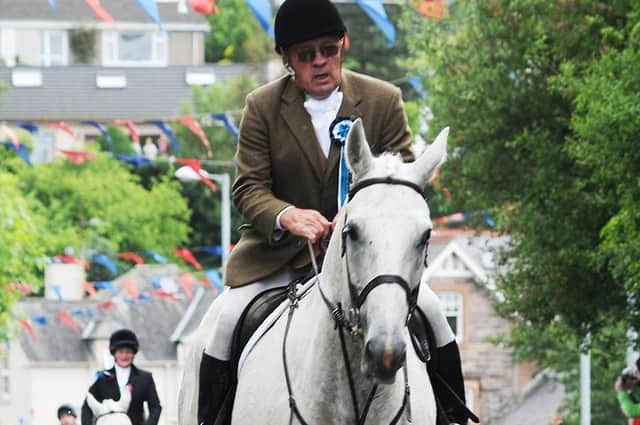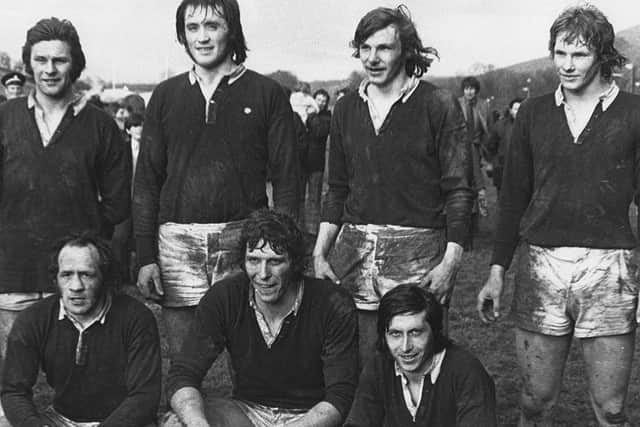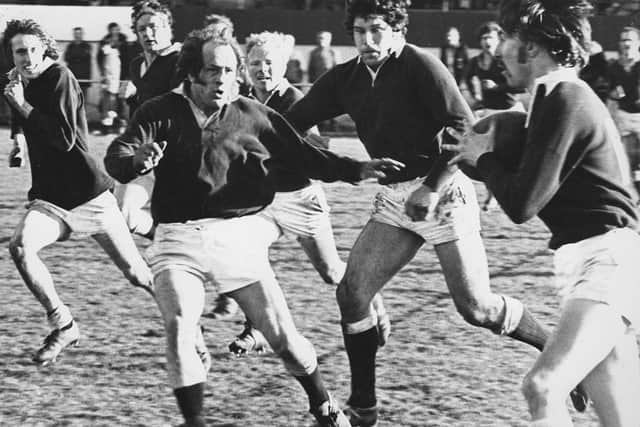Selkirk rugby stalwart Dave Firth mourned following death at age of 80


Born on October 26, 1943, at his parents’ Gillietrang farm on the small Orkney island of Burray, he was the youngest of Thomas and Isabella Firth’s four children.
His siblings were Tommy, Elspeth and Roy, the latter two having predeceased him.
Advertisement
Hide AdAdvertisement
Hide AdIn 1945, the family left the island and moved to Bridgeheugh Farm at Lindean on the outskirts of Selkirk. It was there that Dave was to discover two of his biggest passions in life – rugby and common ridings.


Educated at the village school at Lindean and at Selkirk High, he left the latter aged 15 to begin a motor engineering apprenticeship at a Galashiels garage.
Unable to settle, he left to take a job at the then Selkirk headquarters of the Southern Reporter, training as a printer, and worked there for the next 15 years.
Firth then spent short periods working for the old Hawick News and the former Ettrick and Lauderdale District Council’s parks department before returning to Hawick for a 27-year spell as in-house printer for Pringle of Scotland.
Advertisement
Hide AdAdvertisement
Hide AdUnable to settle down after notionally retiring, he was employed by the Glenvarigill motor dealership as a driver before joining Hunter Cabs in Selkirk, where he was responsible for transporting children with additional needs to school, a role he loved and only finished at Christmas last year.


For someone who made such a big impact on the rugby field, ironically Firth didn’t start playing the game until he was 14.
He spent three seasons turning out for Selkirk Youth Club, being selected at prop for the South of Scotland semi-junior XV against Durham Colts in 1962.
His powerful displays at under-18 level saw him make the switch to Philiphaugh a season early at the request of Selkirk’s senior selectors.
Advertisement
Hide AdAdvertisement
Hide AdHe made his first XV debut in 1963, going on to make more than 250 senior appearances for the club, almost all at openside flanker.
A powerful player, supremely fit and highly competitive, in 1969 he was selected for a Scottish Borders XV to play Durham County at Ashbrooke in Sunderland.
In 1975, at the age of 31, he was a member of the first-ever Selkirk side to win the Hawick Sevens title, defeating Kelso 24-0 in the final.
Earlier that year, he had been persuaded to come out of retirement specifically for the spring sevens circuit, and after triumphing at Mansfield Park, he and his team-mates lifted the Earlston Sevens trophy the following day.
Advertisement
Hide AdAdvertisement
Hide AdSelkirk’s most-capped Scotland internationalist, John Rutherford, described him as an “incredible’ rugby player”.
“Dave had amazing stamina. He just never stopped running,” said the ex-British and Irish Lions fly-half.
“I heard lots of teams talking about Dave as being a complete nuisance, but in my book that represented a massive compliment to his effectiveness on the pitch.
“He captained the club for the 1973/74 season and was hugely respected by all the players.
Advertisement
Hide AdAdvertisement
Hide Ad“Like a number of good Border guys, Dave perhaps wasn’t the greatest speech-maker. However, you didn’t need that with Dave because he always led from the front.”
It was also telling how many of Firth’s former opponents visited him in the Borders General Hospital’s Margaret Kerr Unit during the final ten weeks of his life.
One of them, former Kelso captain and Scotland internationalist Eric Paxton, had formed a special bond with his opposite number, saying: “I was 17 when Kelso met Selkirk in that 1975 Hawick Sevens final, when Dave was playing at hooker.
“He was always a really tough opponent, and over the years we had some great games on the park, but just as importantly we enjoyed great banter off it.”
Advertisement
Hide AdAdvertisement
Hide AdPaxton, 1976’s Kelso laddie, added: “Dave was always a gentleman and also a big supporter of the local festivals.
“I rode at Flodden last year and remember seeing Dave standing at Cornhill watching the cavalcade. Although I’d passed him, I got off my horse and went back to speak him. He was just a great guy.”
Firth met his future wife, Linda Henderson, in the early 1960s when she would stable her horse at Bridgeheugh Farm prior to Selkirk Common Riding.
Their mutual love of jiving at the Gala Palais meant they soon became an item, and after a three-year engagement the couple were married at St Giles registrar’s office in Edinburgh on May 15, 1964.
Advertisement
Hide AdAdvertisement
Hide AdLater that year, the couple’s son, Kenny, was born, with their daughter Aileen arriving in 1968.
Linda was an ardent follower of Selkirk’s common riding, not least because her father, Daniel ‘Kinny’ Henderson, served as royal burgh standard bearer in 1937 and 1943, one of only five men to have cast the burgh flag twice.
The family’s common riding tradition was continued when Kenny was appointed royal burgh standard bearer in 1991, and Aileen inherited Linda’s love of horses, having rarely missed riding the marches since her school days.
Kenny’s appointment was undoubtedly one of Firth’s proudest moments, another coming in 2017 when Aileen won a national award for retraining horses at Doncaster Racecourse on her mount Made in Time.
Advertisement
Hide AdAdvertisement
Hide AdAfter his rugby-playing career ended, Firth took on various coaching duties at Philiphaugh, including coaching Selkirk’s ladies’ sevens team.
In the early 1970s he and Alan Hulme were responsible for starting the club’s mini-rugby section.
For two years Firth also coached the Selkirk ladies’ hockey team, often doubling up as umpire, minibus driver and fundraiser.
His final outing in a Selkirk rugby jersey came at the age of 59, when he turned out for the club’s veterans’ XV.
Advertisement
Hide AdAdvertisement
Hide AdIt is perhaps fitting that Hawick’s Bill McLaren, the Voice of Rugby, should have the final word on one of the Border game’s most respected exponents. In his Glasgow Herald column, the legendary BBC commentator wrote: “The top accolade on the 1976 Border spring sevens circuit should go to the oldest player in this series. At 33 he ran himself to a standstill, tackling like a demon.
“No one deserves a medal this spring more than the veteran David Firth, the ‘Durable Dynamo’.”
Firth is survived by his wife Linda, son Kenny, daughter Aileen and their extended family.
His funeral service will take place at the Borders Crematorium at Melrose on Friday, December 15, at noon.